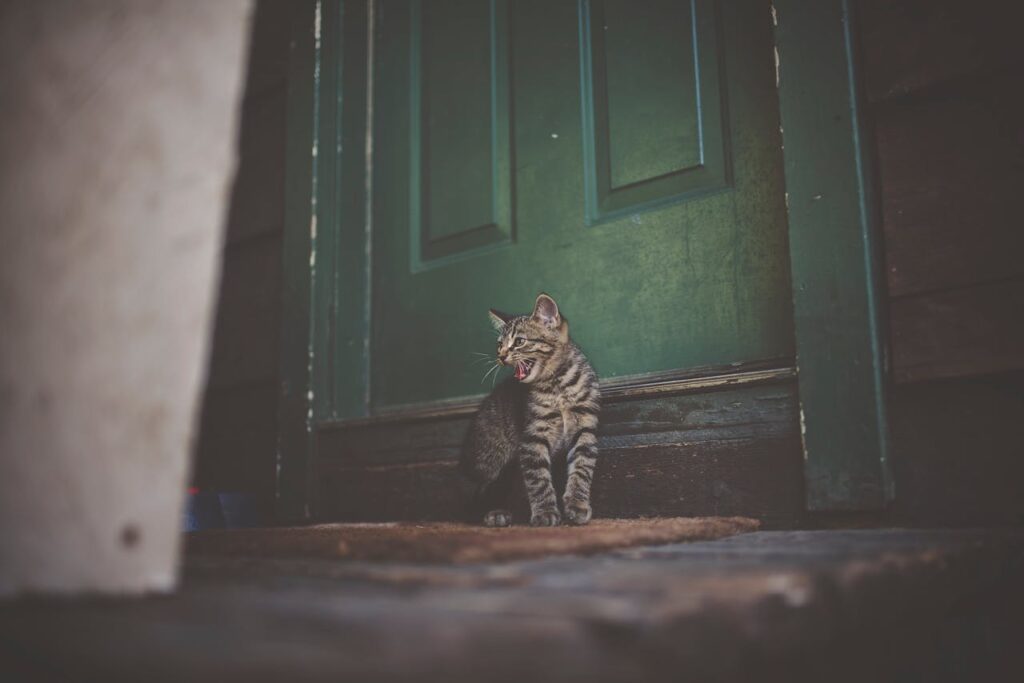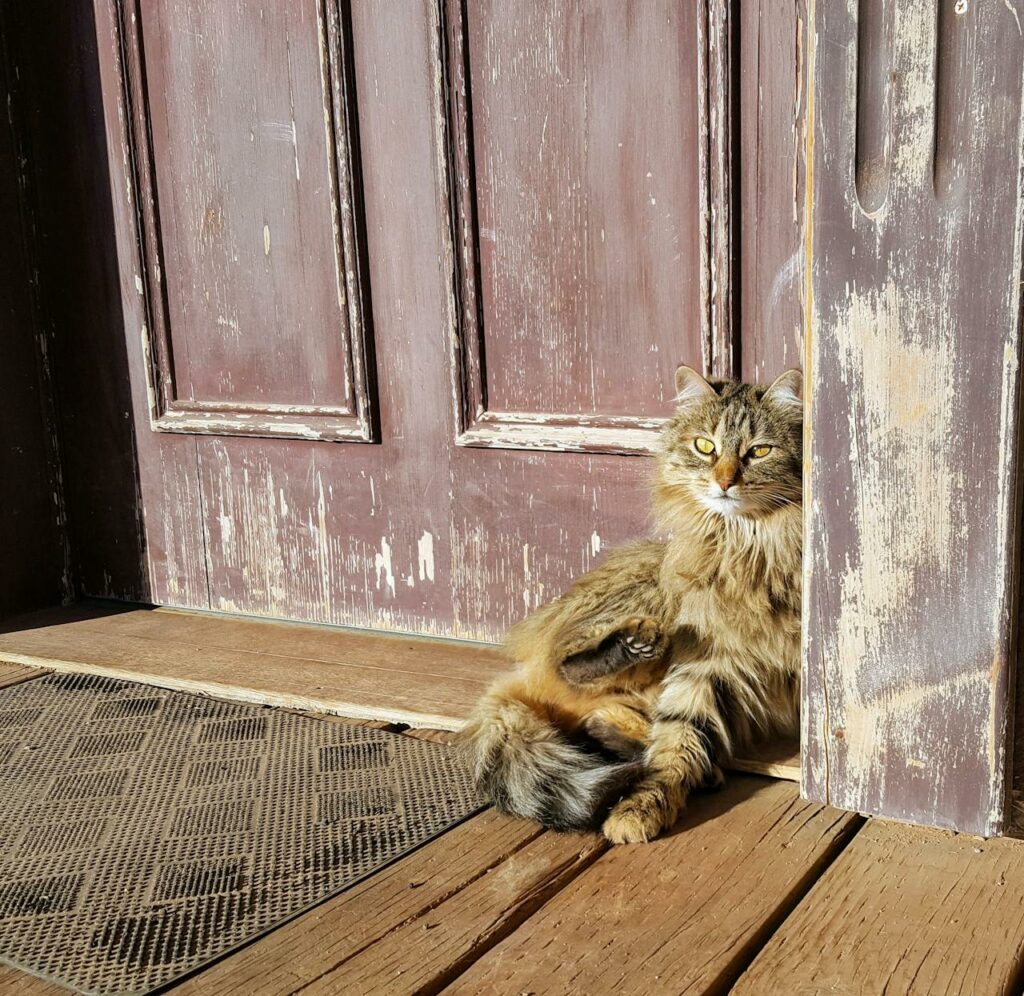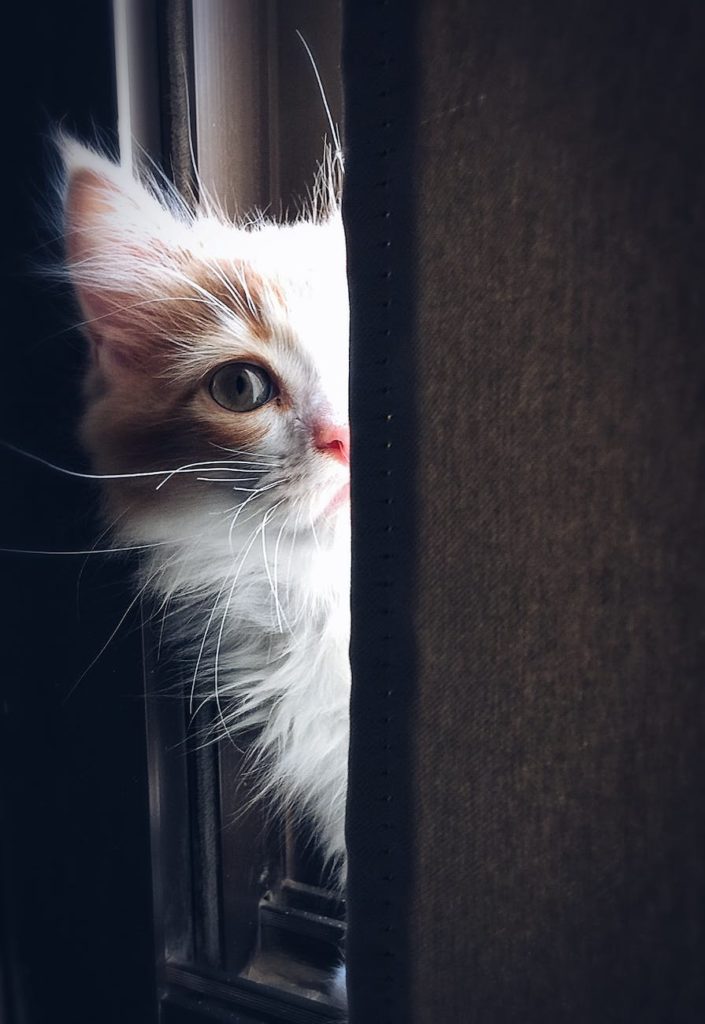Prevent Your Cat From Darting Out The Door
Preventing your beloved cat from darting out the door is not only important for their safety but also for your peace of mind. In this article, we will provide you with a comprehensive guide on how to prevent your cat from darting out the door. We understand that as a cat owner, you want to keep your feline friend safe and secure. Therefore, we have compiled a list of tips and tricks that can help you achieve that.
Live Pee Free! Odor Eliminator 100% Eliminates Pet Odor on Contact. 20% Off. No Enzymes, No Fragrance, No Detergent, No Bleach – Safe for Kids and Pets.Table of Contents
As a cat owner, you know the joys of having a feline companion. However, with that joy comes the challenge of keeping your curious cat from making a beeline for the door every time you open it. Cats are naturally curious creatures, and their instincts often lead them to explore the great outdoors, which can pose significant risks. This guide offers ten essential tips to prevent your cat from darting out the door, ensuring both their safety and your peace of mind.
Understanding Your Cat’s Behavior
Cats possess an innate curiosity that drives them to explore their surroundings. This behavior is rooted in their nature as hunters. When you open the door, the sights, sounds, and smells of the outside world become overwhelmingly enticing. Consequently, as a responsible cat owner, it’s vital to understand this instinctual behavior before implementing strategies to prevent your cat from darting out the door.
Moreover, recognizing your cat’s motivations can help you devise effective strategies. For example, if your cat seems to be particularly drawn to the outside sounds of birds chirping or wind rustling through leaves, you can better tailor your approach. Acknowledging these factors allows you to create a more enriching indoor environment, making your home captivating enough to keep your feline friend inside.
Create a Safe and Engaging Indoor Environment
To effectively prevent your cat from darting out the door, you must first consider their indoor living conditions. A stimulating and engaging environment can significantly reduce their urge to escape. Start by providing ample entertainment options, such as scratching posts, climbing trees, and interactive toys.
In addition, invest in cat-friendly furnishings. Window perches offer a cozy spot for your cat to watch birds and passersby, quenching their desire for outdoor exploration without compromising their safety. Prevent Your Cat From Darting Out The Door. Moreover, consider rotating toys regularly to maintain interest and keep your cat mentally stimulated. By cultivating a lively and engaging indoor environment, you can effectively deter your cat from seeking escapades beyond the threshold.
Utilize Barrier Methods
Sometimes, the simplest solutions are the most effective. Consider employing physical barriers to deter your cat from rushing out the door. For instance, a baby gate can create a secondary barrier to entry, giving you additional time to secure the door upon entering or exiting.
Furthermore, you might consider using a screen door to allow for ventilation while keeping your cat inside. Ensure the screen is robust enough to withstand any attempts to claw or push through. By employing these barrier methods, you not only prevent your cat from darting out the door but also create an extra layer of security in your home.
Train Your Cat with Commands
Training your cat can significantly reduce the likelihood of them darting out the door. Start with basic commands such as “stay” or “come,” which can help instill discipline and promote desired behaviors. Prevent Your Cat From Darting Out The Door. Positive reinforcement, using treats or affection, is key to successful training sessions.
After establishing a few basic commands, begin to practice them during door-opening situations. For example, when you prepare to open the door, use the “stay” command, and reward your cat for following your instruction. Gradually, this will help them associate the command with the behavior you want to reinforce, thereby reducing their impulse to rush out when the door opens.
Establish a Controlled Entry Routine
Creating a structured entry and exit routine can help to manage your cat’s behavior. Before opening the door, always announce your intention or prepare your cat for what is about to happen. You can use phrases like “door’s opening” to signal that they need to stay at a distance.
In addition, practice controlled entries and exits by designating specific time periods for opening the door. Prevent Your Cat From Darting Out The Door. By regularly repeating this process, your cat will have a better understanding of what to expect. They will start associating door openings with your cues instead of viewing them as an invitation to dash outside.
Use Deterrents Wisely
Applying deterrents can be an effective means to discourage your cat from dashing toward the door. For instance, place double-sided tape near the entrance; cats dislike the texture underfoot, making them hesitant to approach. Prevent Your Cat From Darting Out The Door. Another option involves using scents that cats find unattractive, such as citrus.
However, it is crucial to use deterrents responsibly and humanely. Avoid any methods that cause distress or harm to your cat. Instead, focus on gentle deterrents that will encourage your cat to stay away from the door while fostering a safe environment. Prevent Your Cat From Darting Out The Door. Regardless of the approach, regular evaluation and adjustment can help you modify your deterrents according to your cat’s changing behaviors or preferences.
Enrich Your Cat’s Life with Playtime
Playtime is essential to your cat’s well-being, and when done right, can channel their adventurous spirit. Engaging them in interactive play with wand toys or laser pointers can help alleviate their curiosity about the outdoors. Prevent Your Cat From Darting Out The Door. Tailor your play sessions to mimic hunting behavior, as this will satisfy their instinctive urges.
Moreover, consider scheduling play sessions throughout the day. Frequently engaging your cat not only entertains them but also provides physical exercise, reducing excess energy that could lead to darting out the door. Prevent Your Cat From Darting Out The Door. When your cat is more mentally and physically stimulated, they are less likely to seek external adventures, effectively addressing the behavior you want to prevent.
Provide Alternatives for Outdoor Exploration
For some cats, a longing for the outdoors is unquenchable. Offering alternatives can turn their gaze from the door to other exciting options. Indoor enrichment, such as bird feeders placed near windows, can provide hours of entertainment. Prevent Your Cat From Darting Out The Door. Watching chirping birds and fluttering squirrels allows your cat to indulge in a natural instinct without the risks of outdoor exploration.
Additionally, consider setting up a “catio” (a cat patio) or a balcony enclosure. These safe outdoor spaces allow your cat to experience the outdoors without the chance of escape. Prevent Your Cat From Darting Out The Door. By offering these alternatives, you can transform your cat’s desire for outdoor adventures into safe and enjoyable experiences that keep them content and less inclined to dart out the door.
Monitor Your Guests’ Behavior
Keeping your cat from darting out the door isn’t always a solo effort; it often requires vigilance from all household members and visitors. Prevent Your Cat From Darting Out The Door. One common scenario involves guests failing to notice your cat’s quick movements toward the door. To prevent this, inform guests about your cat’s curious tendencies upon arrival.
Consider establishing a specific protocol for entering your home. For example, ask guests to call out to you before entering to ensure you have your cat secured in another room if necessary. Prevent Your Cat From Darting Out The Door. By maintaining awareness among your household and any visitors, you create a unified front toward preventing unsupervised darting through the door, contributing to your cat’s safety.

The Importance of Regular Health Checks
Sometimes, a cat’s desire to bolt outdoors can stem from underlying health issues, including anxiety or stress. Regular veterinary check-ups ensure your feline remains in good health and allows for early intervention should any behavioral changes arise. Prevent Your Cat From Darting Out The Door. Your vet can provide valuable insights related to your cat’s behavior and suggest steps for managing it sustainably.
Moreover, addressing health concerns helps you establish a trusting bond with your cat. Providing a stress-free environment is essential for overall well-being. Prevent Your Cat From Darting Out The Door. By keeping watch on their health and extending extra care, you mitigate any tendencies toward escape behavior related to discomfort or anxiety, proving advantageous in your quest to keep your cat safely indoors.
1. Train your cat
The first and most crucial step in preventing your cat from darting out the door is to train them effectively. Start by teaching them basic commands such as “stay” and “come.” Prevent Your Cat From Darting Out The Door. Consistency is key, so practice these commands daily and be patient with your feline friend. You can use treats as a reward for positive behavior, reinforcing their understanding of what you expect.
Additionally, you can incorporate toys and interactive playtime to distract them from the door, creating fun alternatives that keep them engaged indoors. Prevent Your Cat From Darting Out The Door. By doing this, your cat will learn that there are plenty of entertaining activities to enjoy inside the house, reducing their desire to dash outside and ensuring a safer environment for them.
Keep your cat entertained
A bored cat is more likely to try to escape through the door, which can lead to potential dangers. Therefore, it’s crucial to keep your cat entertained and mentally stimulated. Prevent Your Cat From Darting Out The Door. Provide them with a variety of toys, such as feather wands, laser pointers, and interactive puzzles that engage their hunting instincts. Scratching posts and cat trees also offer great outlets for climbing and scratching.
Additionally, consider setting up cozy perches by windows where they can observe the outside world. If you have the space and time, getting a companion pet might be beneficial, giving your cat extra social interaction and fun.
3. Provide a secure indoor environment
Make sure that your cat has a safe and secure indoor environment to thrive in. Prevent Your Cat From Darting Out The Door. Check all windows and doors for any gaps, holes, or potential escape routes that your cat can slip through. It’s also a good idea to inspect your home for small openings or areas where your feline friend might squeeze out, including vents and ducts.
You can install sturdy screens on your windows and doors to provide an extra layer of protection against unwanted escapes while still allowing fresh air to circulate. Prevent Your Cat From Darting Out The Door. Investing in cat-proofing materials and keeping hazardous items out of reach will enhance your cat’s safety even further.

4. Use Deterrents
Using deterrents such as motion-activated alarms, double-sided tape, or citrus sprays can be effective in preventing your cat from darting out the door. Prevent Your Cat From Darting Out The Door. Cats don’t like sticky or citrusy substances, so they instinctively avoid areas where these are present.
Additionally, motion-activated alarms will startle your cat, creating an unexpected noise that makes them think twice before attempting to escape. Employing these strategies not only helps keep your feline friend safe indoors but also establishes boundaries that encourage better behavior. By combining these deterrents with positive reinforcement, you can promote a secure and comfortable environment for your cat.
5. Be mindful when entering and leaving the house
Be mindful when entering and leaving the house, as your cat’s safety is paramount. When you approach the door, take a moment to check where your feline friend is situated. If they happen to be near the entrance, gently usher them away to prevent any accidental escapes. Prevent Your Cat From Darting Out The Door. To make this process smoother, consider distracting them with their favorite toys or some tasty treats.
Engaging their attention can provide a fun diversion while you transition in or out. Prevent Your Cat From Darting Out The Door. Establishing this routine will help ensure that both you and your cat feel secure, minimizing the risk of them darting out unexpectedly.
6. Consider microchipping and tagging
Despite your best efforts, accidents can still happen. Therefore, it’s important to microchip and tag your cat. Microchipping involves implanting a small chip under your cat’s skin, which contains your contact information. This technology ensures that if your beloved pet goes missing, anyone who finds them can easily access your details and help facilitate a reunion. Prevent Your Cat From Darting Out The Door. Alongside microchipping, it’s also beneficial to use a collar with an ID tag that displays your phone number. Together, these measures significantly increase the chances of bringing your furry friend back home safely, offering peace of mind for pet owners.
7. Create a Double Door Entry
If possible, consider installing a double door entry or a foyer in your home. This design not only enhances the aesthetics of your entryway but also adds an essential layer of security for your feline friend. By creating this extra barrier between your cat and the outdoors, you significantly reduce the risk of them darting outside. Should your curious cat manage to slip past the first door, there’s still a second door to prevent any accidental escapes. This thoughtful addition not only keeps your pet safe but also provides peace of mind for you as a responsible cat owner.
8. Establish a Routine
Cats thrive on routine, which can play a crucial role in their overall well-being. By establishing a consistent schedule for feeding, playtime, and cuddling, you can create a sense of security for your feline friend. This predictability helps them feel more content and reduces their curiosity about what lies beyond your home’s safety.
When cats understand what to expect throughout the day, they are less likely to dart out the door in search of adventure. Incorporating regular activities, like interactive play sessions or simply snuggling up together in the evening, can enhance their comfort and strengthen your bond.
9. Reinforce Positive Behavior
Whenever your cat exhibits good behavior around the door, reinforce it with praise and treats. Positive reinforcement can be a powerful tool in training your cat to stay away from the door. This means that every time your feline friend chooses to sit calmly or play in another room, shower them with affection and offer a small treat.
Consistency is key, so make sure to recognize these moments regularly. Over time, your cat will associate the desired behavior with positive outcomes, leading to a happier, more content home where both you and your pet feel comfortable and secure.
10. Use Visual Barriers
Sometimes, simply blocking your cat’s view of the door can significantly reduce their desire to dart outside. Consider utilizing curtains or frosted glass to obscure their line of sight, effectively making the door less tempting. This visual barrier not only minimizes their focus on the outside world but also creates a sense of security within your home.
Alternatively, you could position furniture strategically to obstruct their view or use decorative screens to create a more enclosed environment. By implementing these visual barriers, you can help your feline friend feel more at ease and less inclined to rush toward the door.

Conclusion: Cultivating a Safe Haven for Your Cat
In conclusion, preventing your cat from darting out the door requires a combination of understanding your feline’s instincts, creating an engaging indoor environment, training with commands, and establishing routines. The application of deterrents, playtime, alternatives for outdoor exploration, and consistent guest education are equally crucial in this endeavor.
Ultimately, remember that your relationship with your feline companion plays a significant role in their behavior. By focusing on their comfort and well-being, you can foster a secure and loving environment where they feel content and happy, eliminating the need to seek adventure just beyond your doorstep. With these ten essential tips, you will prevent your cat from darting out the door while enriching their life and deepening your connection.
Preventing your cat from darting out the door requires patience, consistency, and effort. By following the tips and tricks we’ve provided, you can create a safe and secure environment for your cat. Remember to be mindful of your cat’s behavior and always keep an eye on them. With time, your cat will learn that the indoors can be just as exciting as the outdoors.



